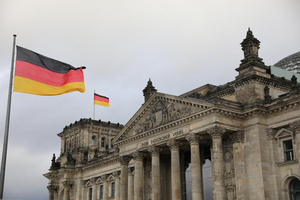Polling for federal elections underway in Germany

Berlin, Feb 23 (IANS) German voters went to polls Sunday to decide the composition of the next Bundestag, the country’s lower house of parliament.
The election was scheduled for September this year, but a snap election was triggered by the collapse of the current ruling coalition of the Social Democratic Party (SPD), the Greens, and the Free Democratic Party last year, reports Xinhua news agency.
The latest polls show that the sister parties of the Christian Democratic Union (CDU) and Christian Social Union (CSU) are taking the lead.
According to Friday’s survey conducted by the Forsa Institute, support for CDU and CSU stood at 29 per cent, compared with 21 per cent for the far-right Alternative for Germany (AfD) and 15 per cent for Chancellor Olaf Scholz’s SPD.
It takes a majority of the 630 seats in the Bundestag to form a stable federal government.
The Forsa survey also showed that 22 per cent of respondents were still unsure of their choice shortly before the election.
Polling stations close at 18:00 local time on Sunday when the counting of votes begins.
A total of 4,506 candidates stand for the election in 299 constituencies, with at least 59.2 million people eligible to vote, official figures show.
Meanwhile, the four major parties vying for voter support, namely the Christian Democratic Union (CDU) and Christian Social Union (CSU), Scholz’s SPD, the Greens and the far-right Alternative for Germany (AfD).
The CDU and CSU union focus on immigration, with its chancellor candidate Friedrich Merz arguing that addressing public concerns over illegal immigration is key to curbing the rise of far-right extremism. Meanwhile, the union also advocates for maintaining Germany’s fiscal rule of debt brake or Schuldenbremse, implementing tax cuts, increasing support for Ukraine and boosting defence spending.
The SPD emphasises tax relief, stricter border controls and infrastructure investments. The Greens share similar priorities with the SPD, including reforming the debt brake, establishing debt-financed investment funds and supporting subsidies for electric vehicles.
The AfD takes a hardline stance on immigration while also pushing for tax reductions, cutting bureaucratic red tape and calling for an end to sanctions against Russia.
In Germany, voters do not directly elect the chancellor. Instead, they vote for members of parliament, who then select the chancellor.
Germany’s electoral system is a mix of direct and proportional representation. Voters cast two ballots — the first vote elects a local constituency representative, and the second supports a political party, determining the proportional distribution of seats in the Bundestag.
The Bundestag has 630 seats under the country’s electoral law, with 299 directly elected and the remaining 331 allocated proportionally based on party votes.
After the vote, the ballots will be counted to determine the number of seats each party secures. While it is rare for a party to win an outright majority, coalitions are often formed to ensure a governing majority in the Bundestag.
–IANS
int/sd/




